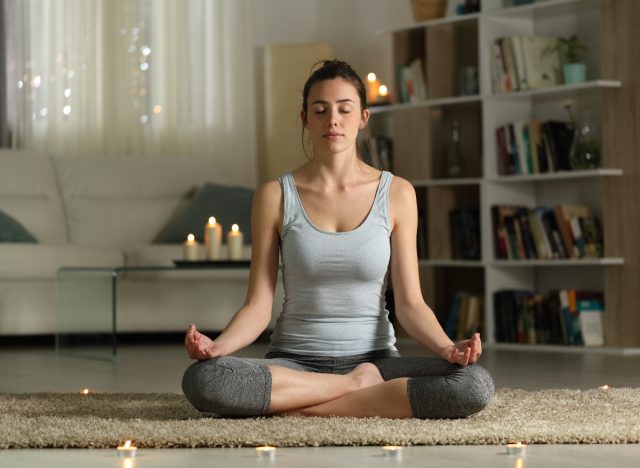6 Ways To Stay Healthy That Don’t Involve Exercise

Achieving a good overall health status involves so much more than heading to the gym for a workout or hopping on trending diets. Sure, exercising provides extraordinary benefits, but strong mental and physical well-being is all about creating a consistent, wholesome lifestyle. Maintaining a balanced, nurturing routine will keep you healthy and fit and have you looking and feeling your absolute best. To help you ease into a salubrious way of living, we’ve come up with six ways to stay healthy without exercising that’ll get you through this winter and beyond. Don’t waste any time getting started—your healthier way of living starts right now!
Let’s be honest: Many individuals truly despise exercising. Some push themselves to do it, but it can very well be the least favorite part of their day. Exercise provides extraordinary benefits, so kudos to you if you work out. But if you’re unable to, aren’t consistent with a plan, or want to give your body some extra TLC, weaving these habits into your everyday life is golden. Once you get used to taking the right steps, you won’t even realize how many benefits you’re racking up! So whether you work out or not, every bit of positive activity that boosts your overall well-being is sheer goodness.
Now that you’re pumped to get started, let’s learn what they are. And next up, don’t miss Fun Winter Activities To Lose Weight Without Trying.
Drink up and stay properly hydrated.

Plain and simple, your body needs water in order in order to function. According to the Mayo Clinic, staying hydrated eliminates your waste, helps keep your body temperature just right, and safeguards your tissues and joints. So drink up, and stay properly hydrated!
Just how much water should you drink each day? The U.S. National Academies of Sciences, Engineering, and Medicine recommends men drink around 15.5 cups each day, and women should drink about 11.5 cups.
Don’t sit still.
Staying seated on the regular is a bad habit. How so? Well, according to a study published by the Annals of Internal Medicine, there’s a link between sitting for a long time and early mortality. In fact, Yale Medicine reports that staying sedentary or sitting too much can lead to many cancers, dementia, weight gain, depression, diabetes, and heart issues.
It’s important to be up and at ‘em. When you are sitting, it’s healthy to involve movement of some sort. According to Harvard Health Publishing, “fidgeting” has been found to torch as many as 350 calories in just one day—research says so. That’s right! Simply tapping your feet, shaking your leg, or tapping your pencil can burn calories and be good for you.
Other small changes you can make? Whether you’re home or at an office, consider taking breaks to get in some stretching and steps. A standing desk is also a better option than a seated one.
Believe it or not, according to a study published in the Journal of Physical Activity and Health, individuals were found to torch 80 calories in an hour when sitting, compared to 88 calories an hour standing. Additionally, standing can decrease back and shoulder pain, according to Harvard Health Publishing.
Shop online with a well-balanced diet in mind.

Help prevent yourself from temptation. Shop with a well-balanced diet in mind, and don’t even purchase foods and snacks you should stay away from. The caveat? Be sure to stock up on healthy choices. Face it: If you’re a snacker, you will probably not stop snacking. But you can control what you have available in your pantry—just be sure to have some nutritious items on hand for picking!
Interestingly, according to a study published in the Journal of Nutrition Education and Behavior, individuals who shopped online for food were found to purchase less “junk food”—aka items like candy, cold or frozen desserts, and grain-based treats—than if they physically went to a store to shop.
Include stairs and steps in every route you take.
Wherever and whenever you head out, make it a habit to park far away from the door. Every step you take adds up, and it’s really healthy for you! In addition, opt for the stairs instead of the elevator.
To give you an idea of how important taking the long route is, according to Harvard Health Publishing, women who walk 4,400 steps a day on average have been found to reduce their risk of death by 41%. If you are only getting in 2,700 steps per day, you are considered sedentary.
How can you sneak in some easy extra steps? Include stairs and steps in every route you take, or get off a stop or two earlier on your train or bus route if possible. For individuals who work at home, use the bathroom upstairs instead of downstairs, and walk while talking on the phone. Break out bringing in groceries to one bag at a time, and take your pooch for an extra walk if you can!
Nourish your body with enough sleep.
Establish and stick to a good sleep routine. After all, your body needs to recharge, and not getting enough shuteye can put you at risk of developing chronic health issues, including cardiovascular disease, type 2 diabetes, depression, and obesity, according to the Centers for Disease Control and Prevention (CDC).
The CDC reports that adults aged 18 to 60 require seven or more hours of sleep each night. Adults who are 61 to 64 need seven to nine hours of shuteye, and adults aged 65 and older require seven to eight hours of sleep on a nightly basis.
There are ways to help you achieve the right amount of sleep, such as establishing a consistent bedtime routine, staying away from your cell phone and electronic devices, keeping your bed for sleeping (not watching TV), and not over-eating too close to hitting the sheets. If you’ve tried these steps and not getting enough sleep remains an issue, it’s essential to consult with your healthcare professional to rectify the situation, according to Harvard Health Publishing. Sleep isn’t a luxury; it’s essential for your body to function properly.
Take measures to keep stress and anxiety at bay.

So many things can cause stress, whether it’s your job, monthly expenses, or family responsibilities. Needless to say, stress can be pretty unavoidable to experience. It’s so important to identify the triggers, and take proper measures to keep stress and anxiety at bay. Your mental and physical wellness depends on it! Stress and anxiety compromise your health, causing high blood pressure and so much more.
In order to address stress, it’s important to maintain a healthy diet, stay active, and be sure to get enough sleep, according to the Mayo Clinic. Relaxing techniques are extremely beneficial, including meditation, yoga, massages, and deep breathing techniques. Journaling is an excellent source of relief for some individuals, as well as putting on some calming music or reading a good book. Alleviating the burden on unnecessary chores is helpful as well, and even taking on some volunteer work.
It’s also important to turn to a professional for help. Sometimes simply reaching out to a therapist is just what you need to share some feelings and pinpoint effective coping mechanisms. By effectively managing your anxiety or stress, you will foster a healthier, happier life balance.
- Source: https://www.mayoclinic.org/healthy-lifestyle/nutrition-and-healthy-eating/in-depth/water/art-20044256
- Source: https://www.yalemedicine.org/news/sitting-health-risks
- Source: https://www.health.harvard.edu/staying-healthy/burning-calories-without-exercise
- Source: https://pubmed.ncbi.nlm.nih.gov/15681386/
- Source: https://www.jneb.org/article/S1499-4046(21)00081-6/fulltext
- Source: https://www.health.harvard.edu/blog/10000-steps-a-day-or-fewer-2019071117305
- Source: https://www.mayoclinic.org/healthy-lifestyle/stress-management/in-depth/stress/art-20046037